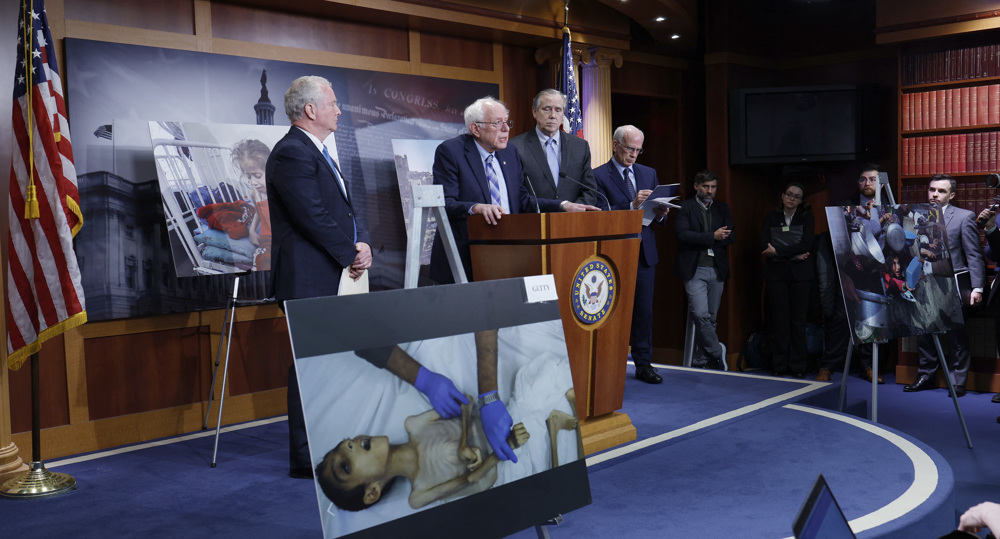US Senate passes 10-year extension of Iran Sanctions Act
The US Senate has passed a 10-year extension of existing sanctions against Iran, sending the measure to the White House for President Barack Obama to sign into law.
Senators on Thursday unanimously backed the renewal of the Iran Sanctions Act (ISA) by a vote of 99 to 0.
The House of Representatives voted 419 to 1 last month to reauthorize ISA, which was first introduced in 1996 to punish investments in Iran's energy industry based on accusations that Tehran was pursuing non-civilian objectives in its nuclear energy program.
The Obama administration has expressed reservations about the utility of the legislation, but congressional aides said they expected Obama would sign it when it reached his desk. The act is set to expire at the end of 2016.
“If the sanctions architecture has expired, then we have no sanctions which we can snap back,” said hawkish Democratic Senator Bob Menendez, who opposed the nuclear accord between Iran and six major powers.
Iran and the five permanent members of the UN Security Council -- the United States, Britain, Russia, China, France as well as Germany – reached a landmark nuclear agreement last year, under which Tehran agreed to limit some aspects of its nuclear program in exchange for the removal of nuclear-related sanctions.
The two sides began implementing the deal, dubbed the Joint Comprehensive Plan of Action (JCPOA), on January 16. However, members of Congress said they wanted ISA to be extended for another decade to send a strong signal that any US president would have the ability to “snap back” sanctions on Iran.
"Unless Congress acts, the congressional sanctions don't exist after December 31," Maryland Senator Ben Cardin, ranking member on the Senate Foreign Relations Committee, said on Tuesday. "The ability to snap back wouldn't be there on the congressional side."
"While we do not think that an extension of ISA is necessary, we do not believe that a clean extension would be a violation of the JCPOA," a senior Obama administration official said on Thursday, according to Reuters.
Senate Foreign Relations Committee Chairman Bob Corker, a hawkish Republican from Tennessee, said the extension of ISA ensures President-elect Donald Trump can reimpose sanctions Obama lifted under the nuclear agreement.
He said in a statement on Thursday, "Extending the Iran Sanctions Act ... ensures President-elect Trump and his administration have the tools necessary to push back” against Iran’s “hostile actions.”
Iran has warned that the renewal of sanctions will be a violation of commitments under the JCPOA, and has threatened reprisal if the US extends the longstanding act.
In a public speech on Wednesday, Leader of Islamic Revolution Ayatollah Seyyed Ali Khamenei warned the US against the renewal of the Iran sanctions, noting that the Islamic Republic would respond if the US proceeded to renew ISA which expires at the end of 2016.
“So far, the current US government has committed several violations with regard to the nuclear agreement,” Ayatollah Khamenei told members of the volunteer Basij forces in Tehran, adding, “The most recent of them is the 10-year extension of the sanctions. If these sanctions are extended, it will surely constitute a violation of the JCPOA and they (the US) should know that the Islamic Republic will definitely react to it.”
"'Initiating sanctions' is no different from 'renewing them after their expiration,' and the latter is also [an instance of imposing] sanctions and violation of the previous commitments by the opposite side," Ayatollah Khamenei said.
Last week, Ali Akbar Salehi, the head of the Atomic Energy Organization of Iran, said Tehran has made necessary preparations and is ready to respond if the US violates the deal.
In case of the final approval of ISA, it will “certainly be a violation of the JCPOA,” he added.
Salehi noted that Iran is ready to respond to any US breach of the JCPOA, saying Tehran, however, will make necessary decisions at the appropriate time and after the assessment and analysis of Washington’s moves.
US vetoing of Gaza ceasefire resolution ‘disgraceful’: Iran’s UN envoy
VIDEO | IAEA adopts anti-Iran resolution tabled by E3
VIDEO | Iran's president urges Pope to help end Israel's onslaught in Gaza
Iran's senior legal official: ICC arrest warrant for Netanyahu ‘great victory'
Nov. 21: ‘Axis of Resistance’ operations against Israeli occupation
VIDEO | Israeli forces storm West Bank’s Jenin again, target civilians
Iran activates advanced centrifuges after IAEA's 'unjust' resolution
VIDEO | Press TV's news headlines










 This makes it easy to access the Press TV website
This makes it easy to access the Press TV website